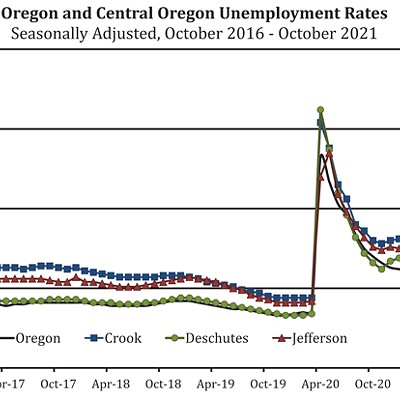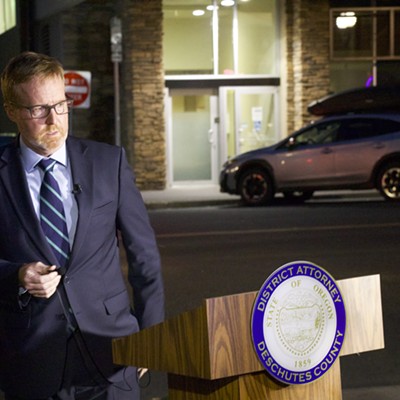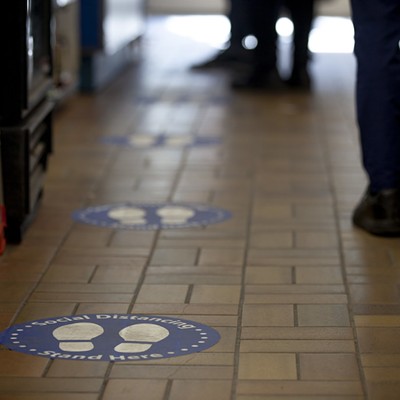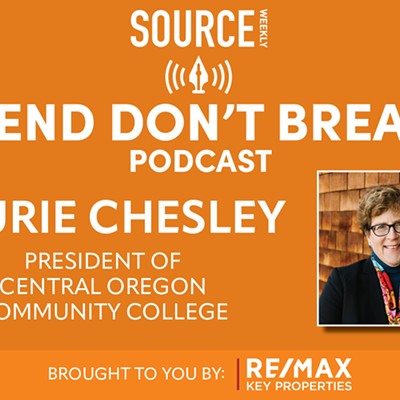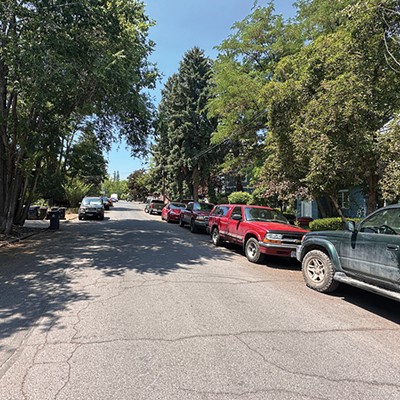In a virtual meeting with 800 attendees this afternoon, Damon Runberg, a state economist with the Oregon Employment Department, described the potential impacts of COVID-19 restrictions on the local economy.
“This is a human health crisis,” Runberg said. “That needs to be addressed first if we can recover economically. The best thing we can do is stay home and stay healthy. To do that efficiently we need to get money in people’s pockets.”
Runberg noted that the enormous bill passed unanimously by the U.S. Senate this morning is a relief bill, not a stimulus bill. A $1,200 check to most Americans plus a $600/week boost in unemployment benefits will help pay the bills, but it unlikely to truly stimulate the economy, he said.
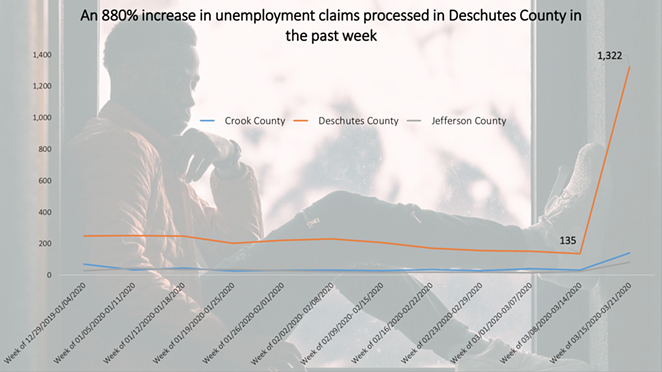
Unemployment Claims
Between the week ending March 14 through March 21, unemployment claims in Deschutes County rose by 880%, from 132 to 1,322, Runberg said. In the state of Oregon, claims went from 4,900 to 76,500. The hardest-hit industry in the state is leisure and hospitality, which count for nearly half of the state’s processed claims.
Runberg recommended that people filing claims should try to do it online, although the site has crashed several times over the last few weeks from an influx of applications. This morning, wait times to file over the phone were about 1.5 hours, he said.
Forty percent of total private sector jobs—or 31,200 jobs—are vulnerable to layoffs in Central Oregon because of the size of the tourism industry, while only one-third of jobs statewide are directly vulnerable.
This is a human health crisis. That needs to be addressed first if we can recover economically. The best thing we can do is stay home and stay healthy. To do that efficiently we need to get money in people’s pockets. - Damon Runberg, Oregon Employment Department
tweet this
Hotel and vacation rental occupancy is also down.
“Typically spring break would be a busy week and we would see occupancy in the 80-90% range and that business is gone,” said Kevney Dugan, CEO of Visit Bend. “Most properties are in the single digits, and most of those are first responders, medical workers or people self-isolating.”
The number of passengers flowing through the Redmond airport is also down 90%, Runberg said.
“These indictors should look bad…. We are preventing a much worse economic crisis,” Runberg said during the presentation. “We just had the longest expansion in the U.S. history, and expansions don’t die of old age, they die of a reason, a shock to the system. We are squarely in a recession.”
Josh Lehner of the Oregon Office of Economic Analysis weighed in yesterday with a blog post titled “The Shape of What’s To Come.” He describes two theories of economic recovery: one is a V-shape with a sharp decline and a sharp recovery. The other is a U-shape with a more gradual recovery over time.
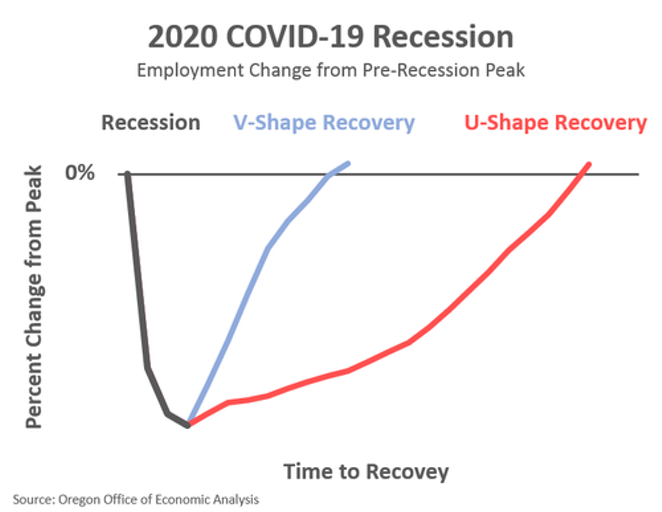
“…The severity of the recession here in Oregon looks to be about what it is nationwide,” Lehner wrote. “Some places within the state do have older populations (mostly rural), a higher reliance on travel and tourism (central, coast, Gorge), and a larger share of investment-related income (central, southern). But from a big picture perspective, the nature of the 2020 recession does not at first look, appear to hit Oregon harder than the rest of the country, for a change.”
Lehner went on to explain that less consumer demand and disruptions in supply chains could lead to some losses in industries that produce goods. A second ripple effect would be that fewer people will move to Oregon; in-migration has been an economic driver in the state for the past few decades.
Central Oregon SOS
While the statistics will likely only get worse in the coming weeks, the coronavirus crisis has brought many businesses together to pool resources and ideas about how they’ll get through this period of revenue loss.
Just two weeks after the pandemic arrived in Central Oregon, pro-business organizations pooled resources to create the website Central Oregon SOS to help both employees and the business community find resources to stay afloat.
Spearheaded by the Bend Chamber of Commerce, funded through a grant from Facebook, and executed by the OSU-Cascades Innovation Co-Lab, the site provides information for anyone suffering from economic damage right now.
“With the assistance of OSU-Cascades’ students and our partners around the region we were able to develop this resource hub to connect all of the great efforts to assist business and our community. It really is a testament to how Central Oregonians work together in a time of need,” said Adam Krynicki, Executive Director of the OSU-Cascades Innovation Co-Lab.
Just like we can prevent the spread of this virus, we can prevent the contagion, the ripple effect to the economy as well. For these companies that are still open, we have to buy takeout, buy gift cards, pick up a book at your local book store. - Adam Krynicki, Executive Director of the OSU-Cascades Innovation Co-Lab
tweet this
The site has comprehensive lists for business owners to connect with funding resources, tax relief, labor information, free business advisors and alternative forms of revenue. Employees will find links to resources on how to brush up on marketable skills while they’re furloughed as well as links to benefits.
“Just like we can prevent the spread of this virus, we can prevent the contagion, the ripple effect to the economy as well,” Krynicki said. “For these companies that are still open, we have to buy takeout, buy gift cards, pick up a book at your local book store….”
Visit Bend is maintaining a list active list of business in Bend that remain open during the COVID-19 pandemic.
The Source Weekly has compiled a 2020 restaurant takeout guide of over 270 restaurants offering meals to go.
Unemployment Resources From Runberg’s Presentation
Unemployment Insurance FAQ
File a claim
Temporary Rules for Unemployment Insurance Benefits Flexibility
Unemployment Insurance 101
Calculate Your Weekly Benefit


